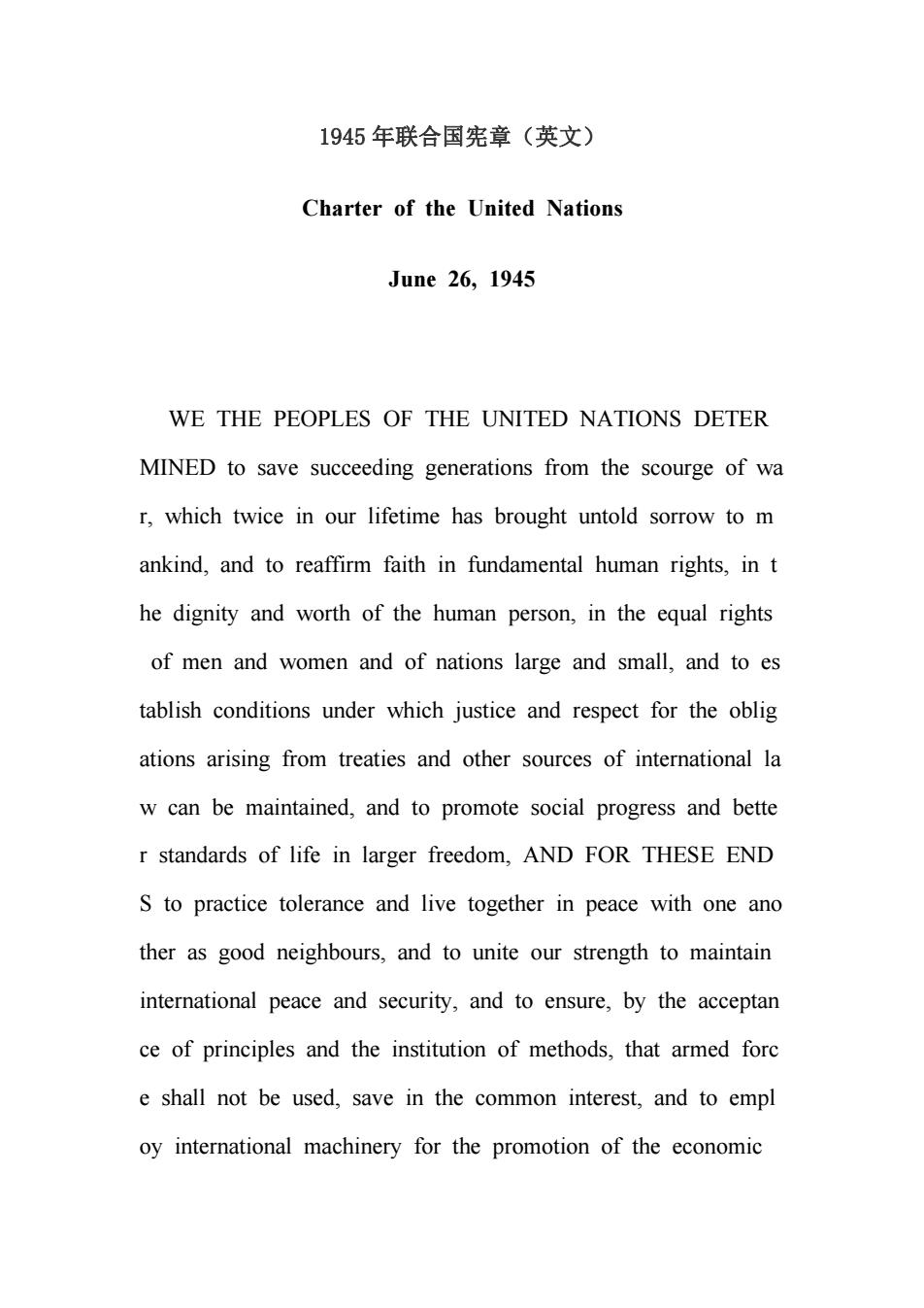
1945年联合国宪章(英文) Charter of the United Nations June26,1945 WE THE PEOPLES OF THE UNITED NATIONS DETER MINED to save succeeding generations from the scourge of wa r,which twice in our lifetime has brought untold sorrow to m ankind,and to reaffirm faith in fundamental human rights,in t he dignity and worth of the human person,in the equal rights of men and women and of nations large and small,and to es tablish conditions under which justice and respect for the oblig ations arising from treaties and other sources of international la w can be maintained,and to promote social progress and bette r standards of life in larger freedom,AND FOR THESE END S to practice tolerance and live together in peace with one ano ther as good neighbours,and to unite our strength to maintain international peace and security,and to ensure,by the acceptan ce of principles and the institution of methods,that armed forc e shall not be used,save in the common interest,and to empl oy international machinery for the promotion of the economic
1945 年联合国宪章(英文) Charter of the United Nations June 26, 1945 WE THE PEOPLES OF THE UNITED NATIONS DETER MINED to save succeeding generations from the scourge of wa r, which twice in our lifetime has brought untold sorrow to m ankind, and to reaffirm faith in fundamental human rights, in t he dignity and worth of the human person, in the equal rights of men and women and of nations large and small, and to es tablish conditions under which justice and respect for the oblig ations arising from treaties and other sources of international la w can be maintained, and to promote social progress and bette r standards of life in larger freedom, AND FOR THESE END S to practice tolerance and live together in peace with one ano ther as good neighbours, and to unite our strength to maintain international peace and security, and to ensure, by the acceptan ce of principles and the institution of methods, that armed forc e shall not be used, save in the common interest, and to empl oy international machinery for the promotion of the economic
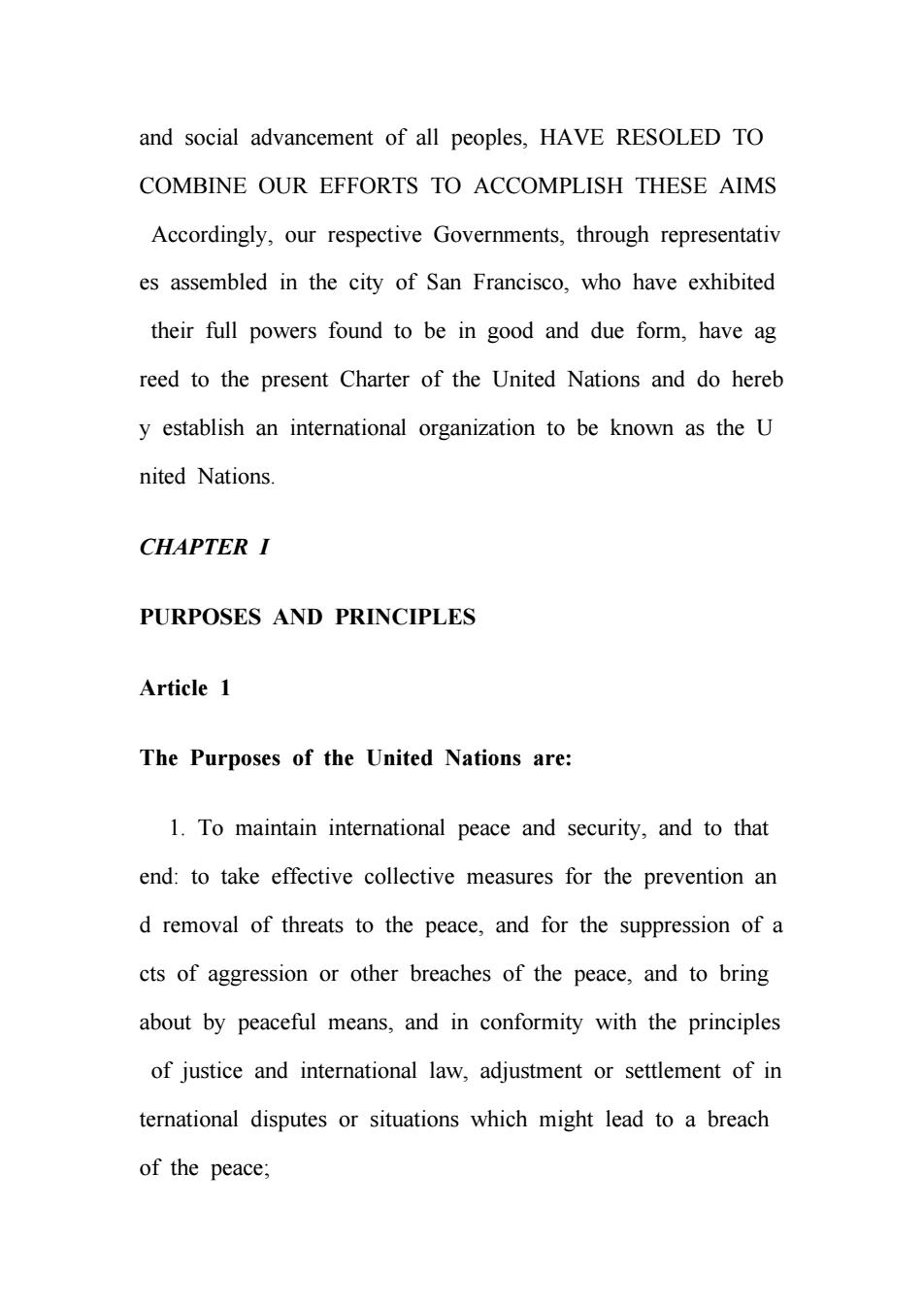
and social advancement of all peoples,HAVE RESOLED TO COMBINE OUR EFFORTS TO ACCOMPLISH THESE AIMS Accordingly,our respective Governments,through representativ es assembled in the city of San Francisco,who have exhibited their full powers found to be in good and due form,have ag reed to the present Charter of the United Nations and do hereb y establish an international organization to be known as the U nited Nations. CHAPTER I PURPOSES AND PRINCIPLES Article 1 The Purposes of the United Nations are: 1.To maintain international peace and security,and to that end:to take effective collective measures for the prevention an d removal of threats to the peace,and for the suppression of a cts of aggression or other breaches of the peace,and to bring about by peaceful means,and in conformity with the principles of justice and international law,adjustment or settlement of in ternational disputes or situations which might lead to a breach of the peace;
and social advancement of all peoples, HAVE RESOLED TO COMBINE OUR EFFORTS TO ACCOMPLISH THESE AIMS Accordingly, our respective Governments, through representativ es assembled in the city of San Francisco, who have exhibited their full powers found to be in good and due form, have ag reed to the present Charter of the United Nations and do hereb y establish an international organization to be known as the U nited Nations. CHAPTER I PURPOSES AND PRINCIPLES Article 1 The Purposes of the United Nations are: 1. To maintain international peace and security, and to that end: to take effective collective measures for the prevention an d removal of threats to the peace, and for the suppression of a cts of aggression or other breaches of the peace, and to bring about by peaceful means, and in conformity with the principles of justice and international law, adjustment or settlement of in ternational disputes or situations which might lead to a breach of the peace;
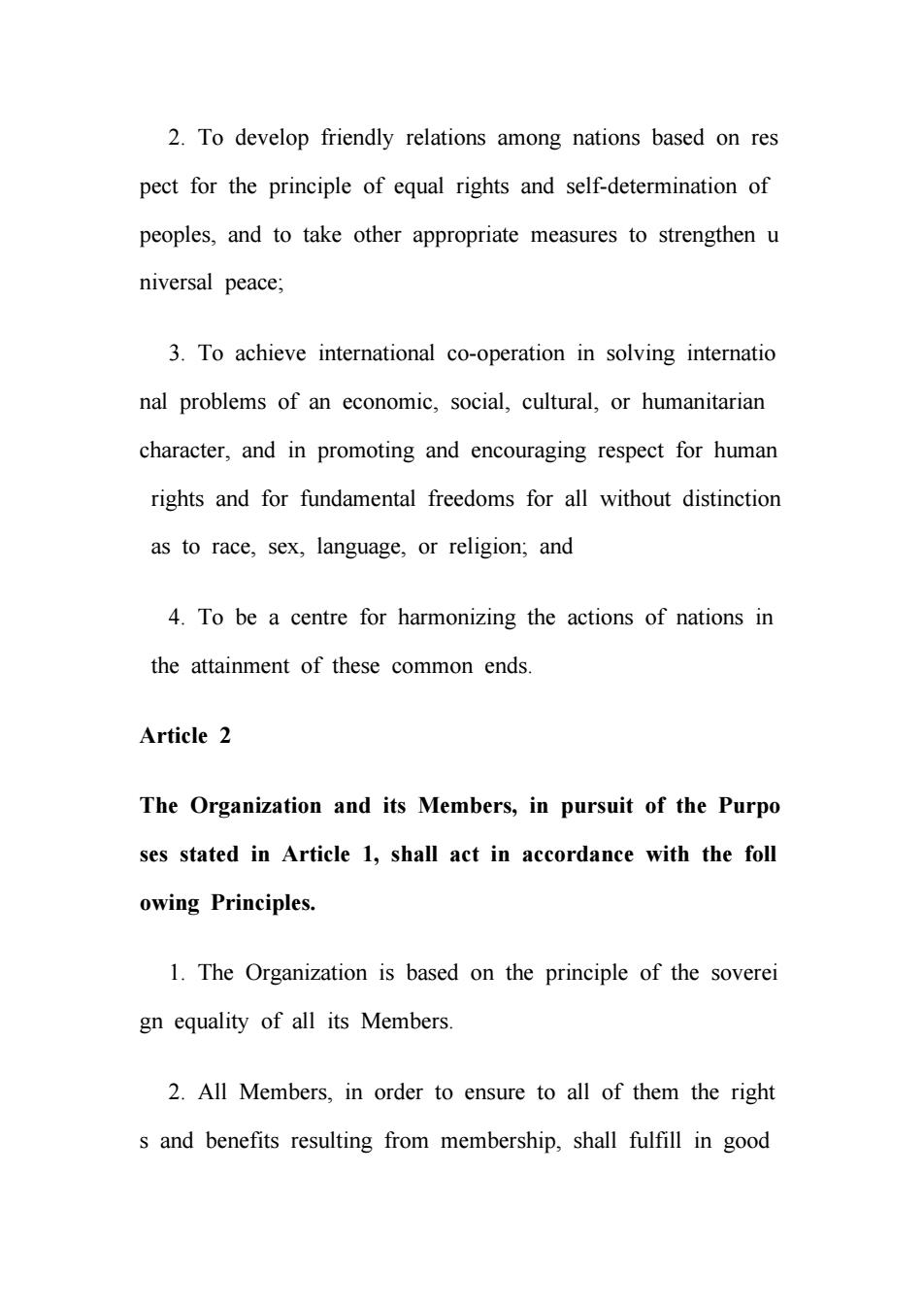
2.To develop friendly relations among nations based on res pect for the principle of equal rights and self-determination of peoples,and to take other appropriate measures to strengthen u niversal peace; 3.To achieve international co-operation in solving internatio nal problems of an economic,social,cultural,or humanitarian character,and in promoting and encouraging respect for human rights and for fundamental freedoms for all without distinction as to race,sex,language,or religion;and 4.To be a centre for harmonizing the actions of nations in the attainment of these common ends. Article 2 The Organization and its Members,in pursuit of the Purpo ses stated in Article 1,shall act in accordance with the foll owing Principles. 1.The Organization is based on the principle of the soverei gn equality of all its Members. 2.All Members,in order to ensure to all of them the right s and benefits resulting from membership,shall fulfill in good
2. To develop friendly relations among nations based on res pect for the principle of equal rights and self-determination of peoples, and to take other appropriate measures to strengthen u niversal peace; 3. To achieve international co-operation in solving internatio nal problems of an economic, social, cultural, or humanitarian character, and in promoting and encouraging respect for human rights and for fundamental freedoms for all without distinction as to race, sex, language, or religion; and 4. To be a centre for harmonizing the actions of nations in the attainment of these common ends. Article 2 The Organization and its Members, in pursuit of the Purpo ses stated in Article 1, shall act in accordance with the foll owing Principles. 1. The Organization is based on the principle of the soverei gn equality of all its Members. 2. All Members, in order to ensure to all of them the right s and benefits resulting from membership, shall fulfill in good

faith the obligations assumed by them in accordance with the present Charter. 3.All Members shall settle their international disputes by pe aceful means in such a manner that international peace and sec urity,and.justice,are not endangered. 4.All Members shall refrain in their international relations f rom the threat or use of force against the territorial integrity o r political independence of any state,or in any other manner i nconsistent with the Purposes of the United Nations. 5.All Members shall give the United Nations every assistan ce in any action it takes in accordance with the present Charte r,and shall refrain from giving assistance to any state against which the United Nations is taking preventive or enforcement a ction. 6.The Organization shall ensure that states which are not Members of the United Nations act in accordance with these P rinciples so far as may be necessary for the maintenance of int ernational peace and security. 7.Nothing contained in the present Charter shall authorize t he United Nations to intervene in matters which are essentially
faith the obligations assumed by them in accordance with the present Charter. 3. All Members shall settle their international disputes by pe aceful means in such a manner that international peace and sec urity, and. justice, are not endangered. 4. All Members shall refrain in their international relations f rom the threat or use of force against the territorial integrity o r political independence of any state, or in any other manner i nconsistent with the Purposes of the United Nations. 5. All Members shall give the United Nations every assistan ce in any action it takes in accordance with the present Charte r, and shall refrain from giving assistance to any state against which the United Nations is taking preventive or enforcement a ction. 6. The Organization shall ensure that states which are not Members of the United Nations act in accordance with these P rinciples so far as may be necessary for the maintenance of int ernational peace and security. 7. Nothing contained in the present Charter shall authorize t he United Nations to intervene in matters which are essentially
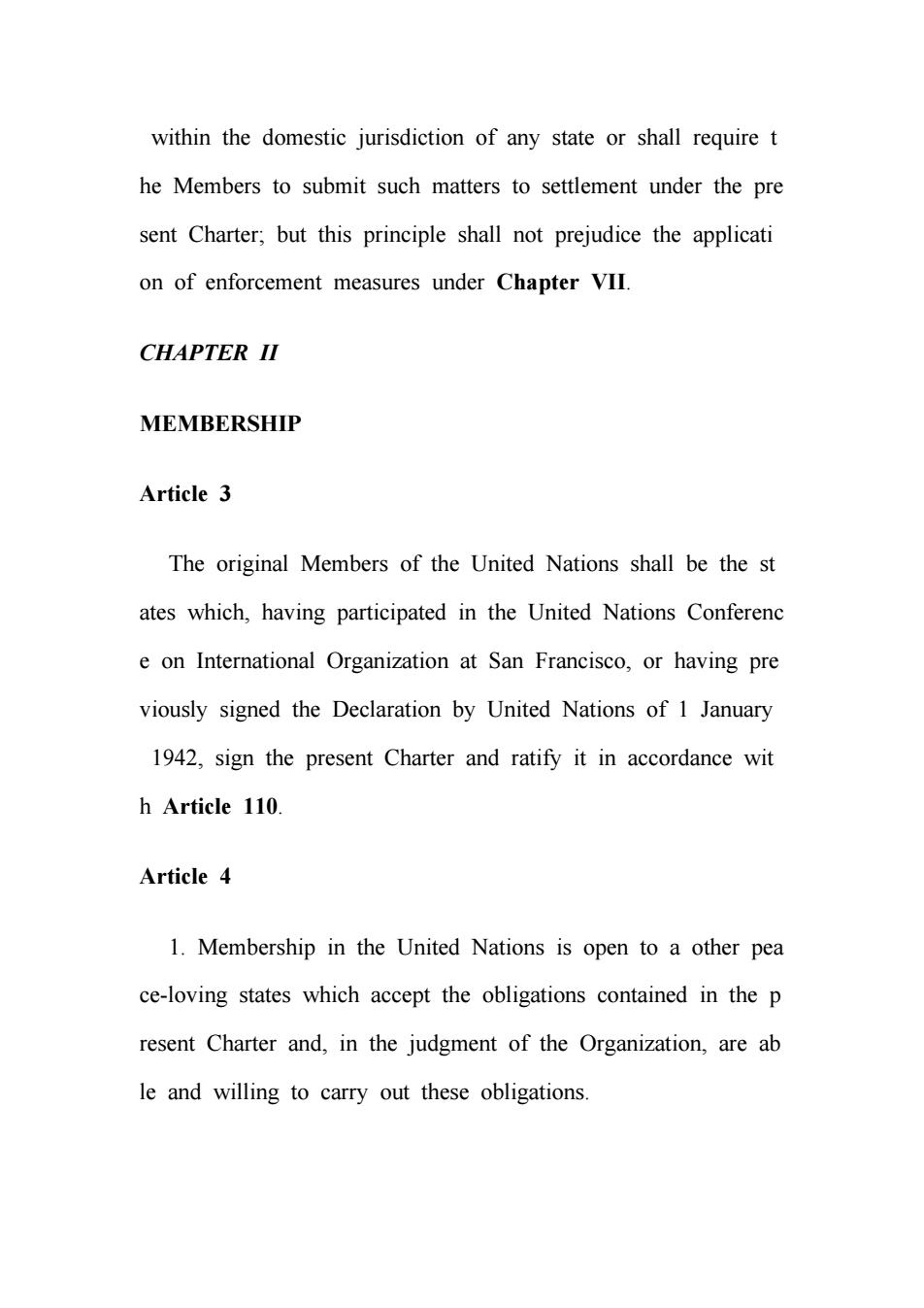
within the domestic jurisdiction of any state or shall require t he Members to submit such matters to settlement under the pre sent Charter;but this principle shall not prejudice the applicati on of enforcement measures under Chapter VII. CHAPTER II MEMBERSHIP Article 3 The original Members of the United Nations shall be the st ates which,having participated in the United Nations Conferenc e on International Organization at San Francisco,or having pre viously signed the Declaration by United Nations of 1 January 1942,sign the present Charter and ratify it in accordance wit h Article 110. Article 4 1.Membership in the United Nations is open to a other pea ce-loving states which accept the obligations contained in the p resent Charter and,in the judgment of the Organization,are ab le and willing to carry out these obligations
within the domestic jurisdiction of any state or shall require t he Members to submit such matters to settlement under the pre sent Charter; but this principle shall not prejudice the applicati on of enforcement measures under Chapter VII. CHAPTER II MEMBERSHIP Article 3 The original Members of the United Nations shall be the st ates which, having participated in the United Nations Conferenc e on International Organization at San Francisco, or having pre viously signed the Declaration by United Nations of 1 January 1942, sign the present Charter and ratify it in accordance wit h Article 110. Article 4 1. Membership in the United Nations is open to a other pea ce-loving states which accept the obligations contained in the p resent Charter and, in the judgment of the Organization, are ab le and willing to carry out these obligations

2.The admission of any such state to membership in the N ations will be effected by a decision of the General Assembly upon the recommendation of the Security Council. Article 5 A Member of the United Nations against which preventive or enforcement action has been taken by the Security Council may be suspended from the exercise of the rights and privilege s of membership by the General Assembly upon the recommen dation of the Security Council.The exercise of these rights an d privileges may be restored by the Security Council. Article 6 A Member of the United Nations which has persistently vio lated the Principles contained in the present Charter may be'e xpelled from the Organization by the General Assembly upon t he recommendation of the Security Council. CHAPTER III ORGANS Article 7
2. The admission of any such state to membership in the N ations will be effected by a decision of the General Assembly upon the recommendation of the Security Council. Article 5 A Member of the United Nations against which preventive or enforcement action has been taken by the Security Council may be suspended from the exercise of the rights and privilege s of membership by the General Assembly upon the recommen dation of the Security Council. The exercise of these rights an d privileges may be restored by the Security Council. Article 6 A Member of the United Nations which has persistently vio lated the Principles contained in the present Charter may be' e xpelled from the Organization by the General Assembly upon t he recommendation of the Security Council. CHAPTER III ORGANS Article 7
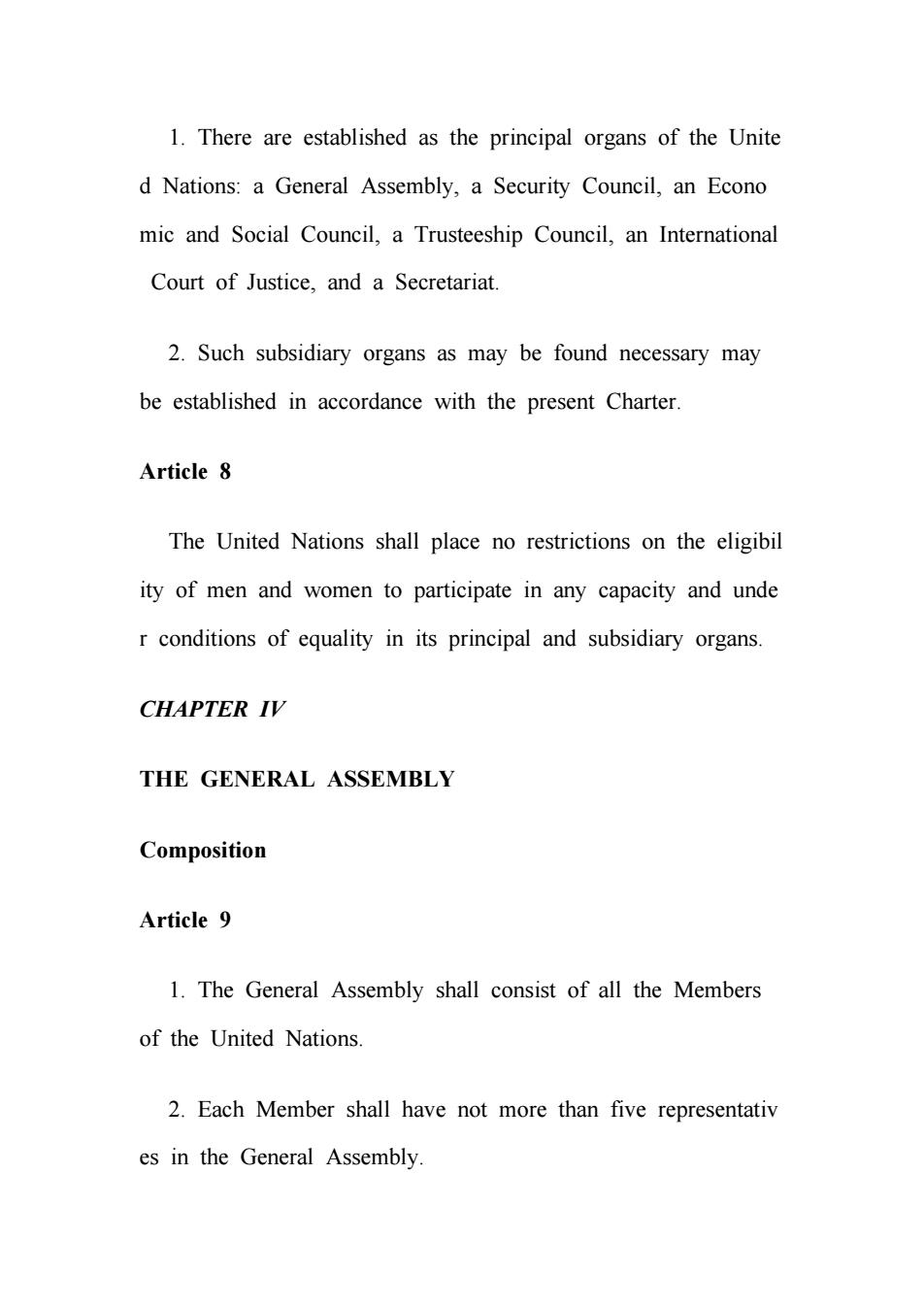
1.There are established as the principal organs of the Unite d Nations:a General Assembly,a Security Council,an Econo mic and Social Council,a Trusteeship Council,an International Court of Justice,and a Secretariat. 2.Such subsidiary organs as may be found necessary may be established in accordance with the present Charter. Article 8 The United Nations shall place no restrictions on the eligibil ity of men and women to participate in any capacity and unde r conditions of equality in its principal and subsidiary organs. CHAPTER IV THE GENERAL ASSEMBLY Composition Article 9 1.The General Assembly shall consist of all the Members of the United Nations. 2.Each Member shall have not more than five representativ es in the General Assembly
1. There are established as the principal organs of the Unite d Nations: a General Assembly, a Security Council, an Econo mic and Social Council, a Trusteeship Council, an International Court of Justice, and a Secretariat. 2. Such subsidiary organs as may be found necessary may be established in accordance with the present Charter. Article 8 The United Nations shall place no restrictions on the eligibil ity of men and women to participate in any capacity and unde r conditions of equality in its principal and subsidiary organs. CHAPTER IV THE GENERAL ASSEMBLY Composition Article 9 1. The General Assembly shall consist of all the Members of the United Nations. 2. Each Member shall have not more than five representativ es in the General Assembly
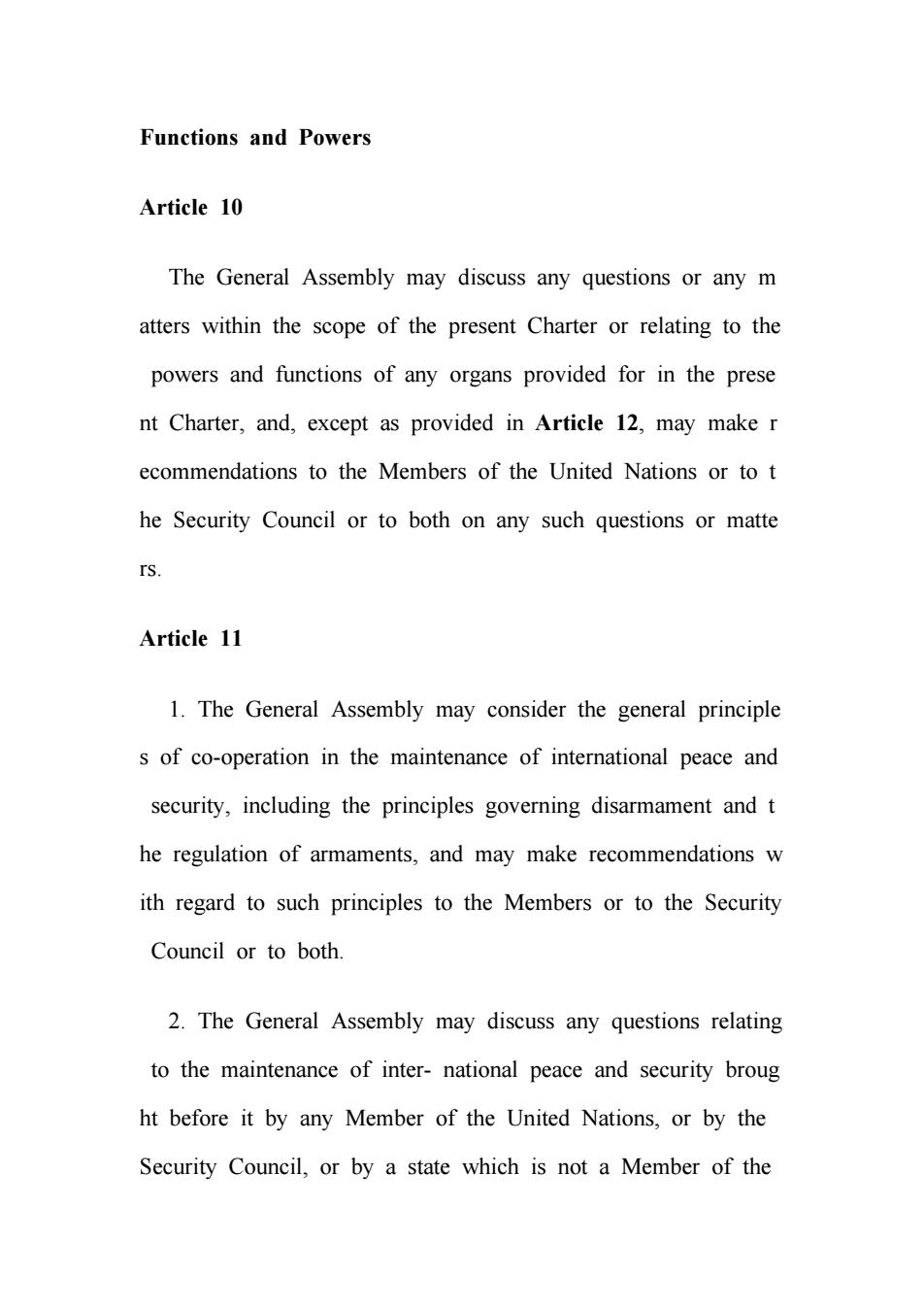
Functions and Powers Article 10 The General Assembly may discuss any questions or any m atters within the scope of the present Charter or relating to the powers and functions of any organs provided for in the prese nt Charter,and,except as provided in Article 12,may make r ecommendations to the Members of the United Nations or to t he Security Council or to both on any such questions or matte rS. Article 11 1.The General Assembly may consider the general principle s of co-operation in the maintenance of international peace and security,including the principles governing disarmament and t he regulation of armaments,and may make recommendations w ith regard to such principles to the Members or to the Security Council or to both. 2.The General Assembly may discuss any questions relating to the maintenance of inter-national peace and security broug ht before it by any Member of the United Nations,or by the Security Council,or by a state which is not a Member of the
Functions and Powers Article 10 The General Assembly may discuss any questions or any m atters within the scope of the present Charter or relating to the powers and functions of any organs provided for in the prese nt Charter, and, except as provided in Article 12, may make r ecommendations to the Members of the United Nations or to t he Security Council or to both on any such questions or matte rs. Article 11 1. The General Assembly may consider the general principle s of co-operation in the maintenance of international peace and security, including the principles governing disarmament and t he regulation of armaments, and may make recommendations w ith regard to such principles to the Members or to the Security Council or to both. 2. The General Assembly may discuss any questions relating to the maintenance of inter- national peace and security broug ht before it by any Member of the United Nations, or by the Security Council, or by a state which is not a Member of the

United Nations in accordance with Article 35,paragraph 2,an d,except as provided in Article 12,may make recommendatio ns with regard to any such questions to the state or states con cerned or to the Security Council or to both.Any such questio n on which action is necessary shall be referred to the Securit y Council by the General Assembly either before or after discu ssion. 3.The General Assembly may call the attention of the Secu rity Council to situations which are likely to endanger internati onal peace and security. 4.The powers of the General Assembly set forth in this Ar ticle shall not limit the general scope of Article 10. Article 12 1.While the Security Council is exercising in respect of an y dispute or situation the functions assigned to it in the presen t Charter,the General Assembly shall not make any recommen dation with regard to that dispute or situation unless the Securi ty Council so requests. 2.The Secretary-General,with the consent of the Security C ouncil,shall notify the General Assembly at each session of an
United Nations in accordance with Article 35, paragraph 2, an d, except as provided in Article 12, may make recommendatio ns with regard to any such questions to the state or states con cerned or to the Security Council or to both. Any such questio n on which action is necessary shall be referred to the Securit y Council by the General Assembly either before or after discu ssion. 3. The General Assembly may call the attention of the Secu rity Council to situations which are likely to endanger internati onal peace and security. 4. The powers of the General Assembly set forth in this Ar ticle shall not limit the general scope of Article 10. Article 12 1. While the Security Council is exercising in respect of an y dispute or situation the functions assigned to it in the presen t Charter, the General Assembly shall not make any recommen dation with regard to that dispute or situation unless the Securi ty Council so requests. 2. The Secretary-General, with the consent of the Security C ouncil, shall notify the General Assembly at each session of an
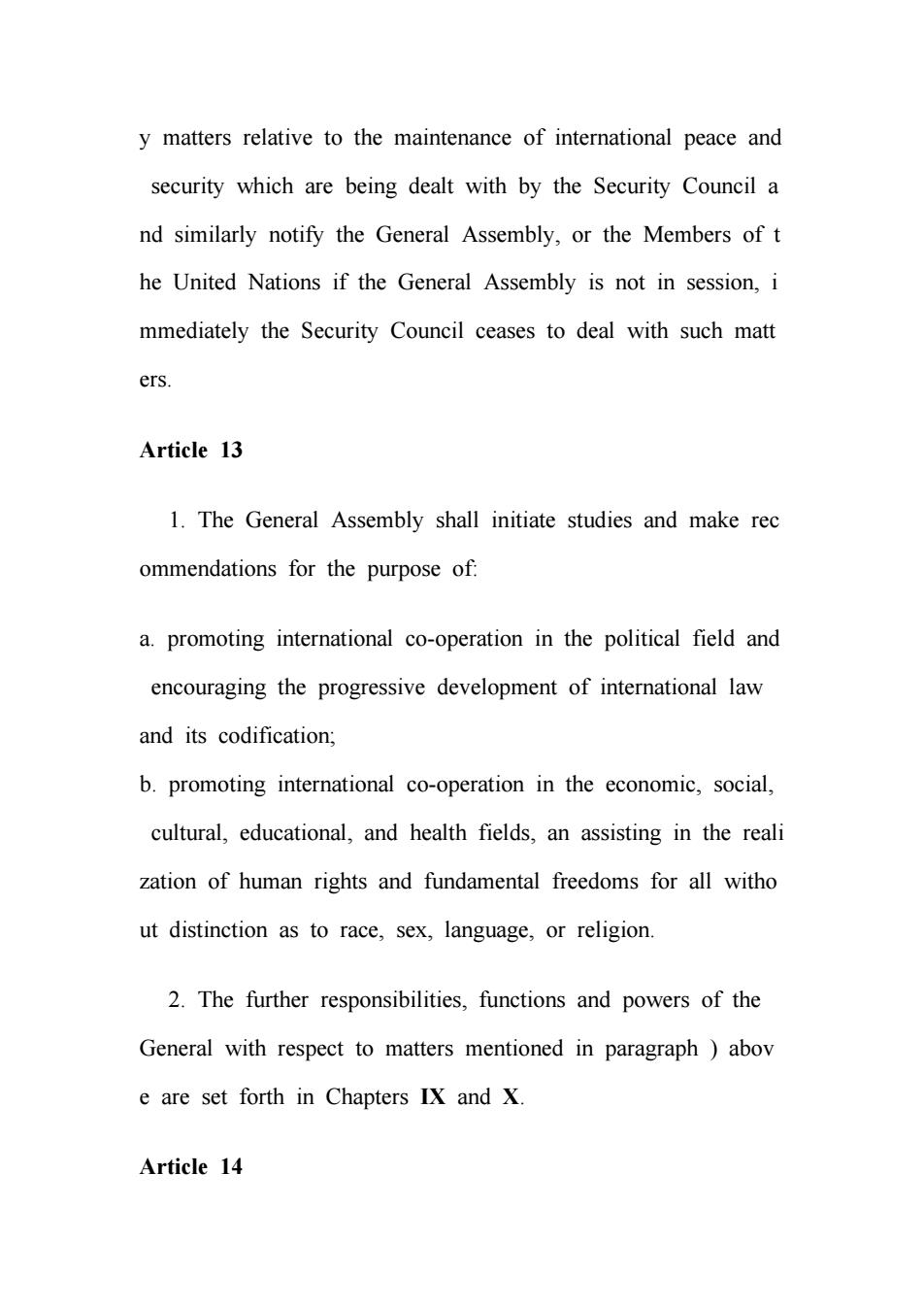
y matters relative to the maintenance of international peace and security which are being dealt with by the Security Council a nd similarly notify the General Assembly,or the Members of t he United Nations if the General Assembly is not in session,i mmediately the Security Council ceases to deal with such matt ers. Article 13 1.The General Assembly shall initiate studies and make rec ommendations for the purpose of: a.promoting international co-operation in the political field and encouraging the progressive development of international law and its codification; b.promoting international co-operation in the economic,social, cultural,educational,and health fields,an assisting in the reali zation of human rights and fundamental freedoms for all witho ut distinction as to race,sex,language,or religion. 2.The further responsibilities,functions and powers of the General with respect to matters mentioned in paragraph )abov e are set forth in Chapters IX and X. Article 14
y matters relative to the maintenance of international peace and security which are being dealt with by the Security Council a nd similarly notify the General Assembly, or the Members of t he United Nations if the General Assembly is not in session, i mmediately the Security Council ceases to deal with such matt ers. Article 13 1. The General Assembly shall initiate studies and make rec ommendations for the purpose of: a. promoting international co-operation in the political field and encouraging the progressive development of international law and its codification; b. promoting international co-operation in the economic, social, cultural, educational, and health fields, an assisting in the reali zation of human rights and fundamental freedoms for all witho ut distinction as to race, sex, language, or religion. 2. The further responsibilities, functions and powers of the General with respect to matters mentioned in paragraph ) abov e are set forth in Chapters IX and X. Article 14